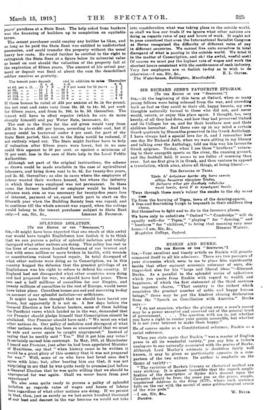BUSKER AND BURKE.
(To toe Karr. or Tin " firsorma."1
Sia,—Your excellent and timely article on Ruskin will greatly commend itself to all his admirers. There are two passages of your discussion which seem to me to place him significantly beside that other eminent economic reformer of ours, dis- tinguished also for his "large and liberal ideas "—Edmund Burke. As a parallel to the splendid series of aphorisms which you quote from Ruskin with regard to wealth and happiness, of which the first statement of the third sentence has supreme charm. " That country is the richest which nourishes the greatest number of noble and happy human beings." there may be put the kindred ;alining declaration from the "Speech on Conciliation with America." Burke says :— "I do not examine, whether the giving away a man's money may be a power excepted and reserved out of the general trust of government. . . . The question with me is, not whether you have a right to render your people miserable, but whether it is not your interest to make them happy."
He of course spoke as a Constitutional reformer. Ruskin as a social reformer.
When you state again that Ruskin "was a master of English prose in all its wonderful variety," you pay him a tribute analogous to one naturally associated with the genius of Burke. Although Lord Mortey's estimate is doubtless fairly well known, it may be given as particularly apposite in a com- parison of the two writers. Its author is emphatic on the theme of variety :—
"The varieties of Burke's literary or rhetorical method are very striking. It is almost incredible that the superb ampli- fication of the deeeription of Ryder Ali's descent upon the Carnatio should be from the same pen a the grave, simple, unadorned Address to the King (1777), where each sentence falls OD the ear with the accent of some golden-tongued crane of the wise gods."






































 Previous page
Previous page